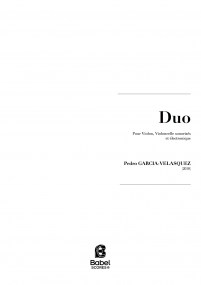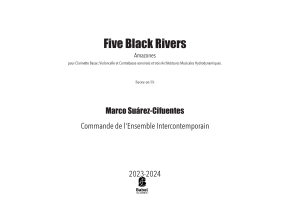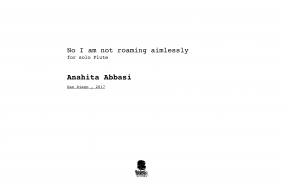all-forgetting-is-retrieval
ISMN : 979-0-2325-7055-6
- Login to create your own lists
all-forgetting-is-retrieval was commissioned by the TACETi Ensemble for the 2019 Thailand New Music and Arts Symposium at the Bangkok Art and Culture Centre (BACC) in Bangkok. This work explores the formation of human memory, retrieval, and failure, drawing from two sources. The first was a passage titled “Myth of Permanent Memory” from Richard A. Chechile’s book Analyzing Memory: The Formation, Retention, and Measurement of Memory: “There is a common belief that forgetting is strictly due to a retrieval failure. It is curious why this idea of a permanent memory is so appealing...the storage of information is not perfect. Storage as well as retrieval is subject to failure. Thus, the hypothesis that all-forgetting-is-retrieval is incorrect. For information in this state of permanent [long-term] memory, all subsequent forgetting is assumed to be caused by a retrieval failure. Yet...there is no known biological mechanism to stop the adaptive changes in memory from continuing and thereby possibly destroying the prior learning record. If the learning environment changes, the same adaptive mechanisms that created the memory in the first place will continue to rearrange the structure of memory and potentially destroy the former memory representation.”
The second source is dialogue from a 1978 ephemeral film, Human Memory, by Harcourt Brace Jovanovich, used as sonic material for the electronics throughout the work, written for eight musicians including a conductor and percussionist who have been augmented by contact microphones and wearable electronics to trigger and govern the behavior of temporal events and media, manipulated through the use of wrist-worn sensors and gestural tracking mapped onto discrete musical parameters. The title is both perplexing and quickly disproven in the above passage, reflecting the strange and unfamiliar space that, for me, the piece inhabits, with “failures” both large and small. Artistically, my apprehension toward falling into familiar patterns and relying on my past compositional work shares a similar cognitive and emotional space as “lost” experiences—the inability to be truly present in a moment, or failure to commit to memory experiences that are simultaneously both formative and fleeting. The rapid loss of their fidelity is staggering, and this work attempts to confront that impermanence and decay. To reflect this, I was interested in both paraphrasing and sampling elements of my past work, alongside the recontextualization of “found” media and sonic material deeply familiar to me. How can we be certain of things we have experienced, and that the events that took place were not, in fact, radically different than what we remember? These inaccuracies and discrepancies that form over time through internal repetition, how information storage and retrieval may be influenced by context, and what kind of experience might interrupt a memory from being formed, are explored.
“The subject of our film is memory. Imagine what your mental life would be like if you had no memory at all.” A man, facing away from the camera, is introduced as “Mr. M.” to Dr. Christopher Ryan and Kathy Montgomery. He claims to recall encountering them before. Immediately following their introductions, Mr. M is asked if he remembers this gentleman’s name, to which he responds “Yes I do.” “What’s his name”…[a long silence]… “No I don’t.” The film’s narrator explains “this patient has suffered brain damage which destroyed his memory. Notice how he fails even the simplest memory test.” He is encouraged to practice reciting their names. The narrator elaborates that “such amnesiacs provide us with a dramatic illustration of the role that memory plays in keeping us in touch with the changing world around us. You might think of your short-term memory as a workbench or countertop onto which you place a box corresponding to each chunk as you attend to it. There’s only a limited amount of space on the counter, so eventually adding a new chunk onto the counter causes some other ones to fall off…”
Alto Saxophone
Trombone
Percussions
Violin
Cello
Real-time electronics
Electric guitar
Motion sensor
Pages - 14









